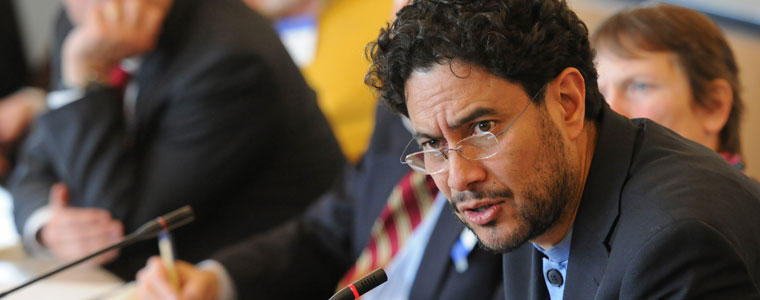Roundtable brings together policymakers, scholars, donors, and a Colombian Congressman
On March 15th, USIP hosted a roundtable discussion on the Colombian peace process launched in Norway in October 2012 and now in its seventh round of talks in Havana.

On March 15th, USIP hosted a roundtable discussion on the Colombian peace process launched in Norway in October 2012 and now in its seventh round of talks in Havana (see USIP, On the Issues: Colombian Peace Talks). The 60-person roundtable at USIP featured Congressman Iván Cepeda, co-chair of the Peace Commission in Colombia’s House of Representatives. Virginia M. Bouvier, USIP’s senior program officer on Latin America, moderated the discussion.
The event began with a presentation by Cepeda on his recent visit to Cuba, where he and five other members of the Peace Commission were invited to meet with the negotiators from the Colombian government and the Colombian Revolutionary Armed Forces (FARC-EP). The congressman conveyed a sense of optimism that the negotiators had reached preliminary agreement on agrarian development policy--the first and largest point of the six-point agenda under discussion—and were preparing to move on to the next agenda item--political participation. Cepeda noted positive signs of a shifting dynamic within and between the parties--including FARC recognition of the current Constitution, the unilateral guerrilla ceasefire from November 2012-January 2013, a growing flexibility in the positions of the parties, and the FARC’s expressed willingness to turn in their weapons and to address the needs of the victims of the conflict. In Havana, members of the Peace Commission delegation discussed the options for ratifying a future agreement, as well as the legal and political mechanisms for moving forward.
The lack of vehicles for civic engagement in the peace process has contributed at least in part to popular skepticism. Congressionally-sponsored mesas regionales, consultations to assemble civil society inputs on the agenda items under discussion in Havana, have produced proposals on the issues of agrarian development, political participation, and illicit crop cultivation that were conveyed to the negotiating teams earlier this year. The congressional delegation announced the Commissions’ intent to reconvene the mesas regionales beginning in April to generate proposals on the theme of “victims.” Cepeda noted in particular the absence of women and women’s perspectives at the table, and said the delegation had discussed with the parties the need to create dedicated spaces for consulting women, indigenous, and Afro-Colombians. He noted the importance of the upcoming national march to support the peace process convened by President Juan Manuel Santos, Bogota Mayor Gustavo Petro, the Peace Commissions of the Colombian Congress, the Marcha Patriótica, and a broad spectrum of social organizations for this coming April 9th.
Following the congressman’s presentation, noted Colombia experts Aldo Cívico (Rutgers University), Cynthia Arnson (Woodrow Wilson International Center for Scholars), Marc Chernick (Georgetown University), and Adam Isacson (Washington Office on Latin America) discussed the challenges and opportunities represented by the peace talks. They welcomed Cepeda’s optimism, and raised concerns about some of the constraints to the process, including continued violence, a skeptical public, the need for security guarantees, the looming electoral timeline, and the hostility to the process of former President Alvaro Uribe and his supporters.
Other roundtable participants included members of the State Department, Department of Defense, Congressional Research Service, the Colombian Embassy, the Mayor’s Office in Bogota, International Monetary Fund, Inter-American Development Bank, World Bank, Organization of American States, faculty from area universities, and a number of policy and advocacy groups. Participants discussed the implications for the peace process of the recent death of Venezuelan President Hugo Chávez, who had played a key role in generating conditions for the peace talks. They talked about the role and potential role of international agencies, anticipated implementation and verification needs, disarmament and reintegration mechanisms, and lessons from other case studies such as Northern Ireland and Guatemala. With a presidential election on the horizon in Colombia in 2014, participants concurred that the peace process in Havana is likely to impact and be shaped by the electoral landscape in Colombia.
Cepeda underscored the longstanding tendency among politicians and the media toward inflammatory and exclusionary rhetoric, and called for a “verbal truce.” Such a truce would be characterized by a more careful, moderated tone and language, in order to create an environment that could support the peace process.
USIP’s roundtable gave Colombia watchers in the U.S. government and the international community a unique inside perspective on the peace table in Havana, and provided an opportunity to reflect jointly on the roles the international community might play to support peace in Colombia. The U.S. Institute of Peace is committed to continuing to provide such forums of discussion and will be hosting a public event on “Land and the Colombian Peace Agenda” at our headquarters on April 3rd.